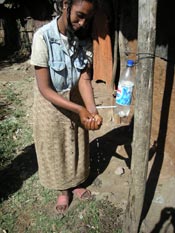
Water, Sanitation, and Hygiene
 While
focusing on private-sector solutions, CPSHI draws on AED's (now FHI 360's)
long history, deep expertise, and broad experience in planning, implementing,
and monitoring water, sanitation, and hygiene (WASH) projects in over
20 countries in the developing world including:
While
focusing on private-sector solutions, CPSHI draws on AED's (now FHI 360's)
long history, deep expertise, and broad experience in planning, implementing,
and monitoring water, sanitation, and hygiene (WASH) projects in over
20 countries in the developing world including:
- Health Improvement Project (HIP): dramatically increased the use of water treatment products, soap for handwashing, and latrines, effectively reducing diarrheal disease.
- Supportive Environments for Healthy Households and Communities: will support the further development, introduction, and delivery of high-impact WASH and indoor air quality interventions, along with improvements in key behaviors and environmental conditions.
- AI.COMM, AI-BCC, and PREVENT: raised awareness and increased the practice of handwashing in more than 30 countries to prevent and contain the spread of the H5N1 and H1N1 viruses.
- Global
Public-Private Partnership for Handwashing with Soap: coordinates
efforts by governments, donors, multinational companies, and nongovernmental
organizations (NGOs) to promote hand washing as a primary intervention
to reduce the spread of communicable disease.
FHI 360 engages the private sector in partnerships with governments and communities to achieve health impact that is more sustainable than if any of these entities worked alone. Beginning with the building blocks of change—behaviors and practices—our goal is to scale up demand for water treatment and sanitation products and services in areas where people lack access to safe water or allow it to become contaminated at the point-of-use.
Achieving high impact through partnerships
Under the POUZN Project, AED used its trademark Full Market Impact™ (FMI™) public-private partnership model to engage government ministries, private-sector players, professional associations, NGOs, and financial institutions in various aspects of project implementation. The end line survey showed an increase of 49 percent in regular use of POU products versus five percent in the comparison area. The project has shown commercial partners how to work successfully with microfinance institutions and NGOs, motivating them to expand interventions to other regions of India.
The Pakistan Safe Drinking Water and Hygiene Promotion Project, employed public-private partnerships, mass media, and interpersonal communications to reach the parents of young children with messages related to safe drinking water treatment, safe water storage, and hygiene. Over 250,000 individuals were reached through community programs and over 300,000 Grade 4 students benefitted from school-based programs. Nationwide mass media reinforced all messages delivered in communities and in schools.
Building on success
FHI 360 leverages existing programs, integrating WASH improvement into other initiatives such as HIV/AIDS treatment and care and school programs.
The T-MARC Project integrated messaging and resources on improved hygiene and safe water treatment, handling, and storage into HIV home-based care programs.
The Mswakini Safe Drinking Water, PUR Demonstration Project distributed PUR® water purification sachets and WASH education in households with people living with HIV in the Masai village of Mswakini in an isolated region of northern Tanzania. The project highlighted the importance of safe drinking water to keep HIV-infected household members in good health and to prevent the onset of opportunistic infections due to diarrhea and a compromised health state.
In Nepal, AED supported Environment and Public Health Organization (ENPHO), a national NGO, in the marketing and distribution of its chlorine product PIYUSH. AED provided marketing technical support for product design and a branded promotional campaign. During the course of the project, awareness of chlorination as a water treatment product increased from 32 to 60 percent. A study of 1,025 households in 2009 showed that 38 percent of households had used PIYUSH at least once, and 12 percent had a chlorine product in the home at the time of the survey. With increased marketing capacity, ENPHO was able to develop partnerships with ten Nepali corporations interested in investing in safe water.
We would like to offer our expertise to your organization. If you would like to work with CPSHI or learn more about the expertise of our staff, please contact pshi@fhi360.org.
Download the Water, Sanitation, and Hygiene fact sheet. (PDF, 491kb)